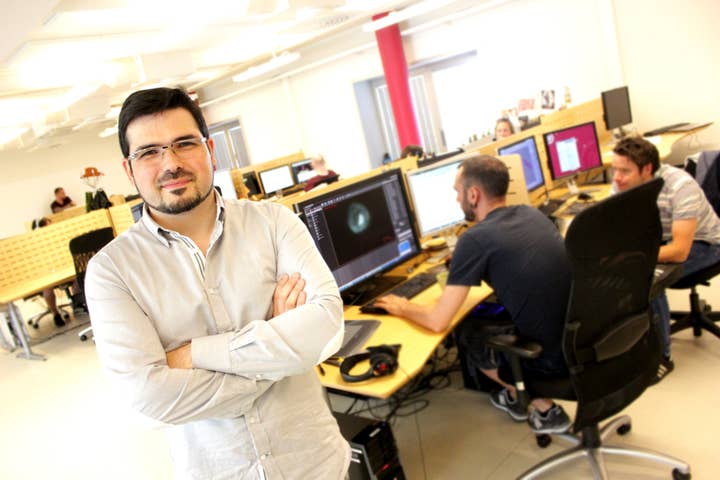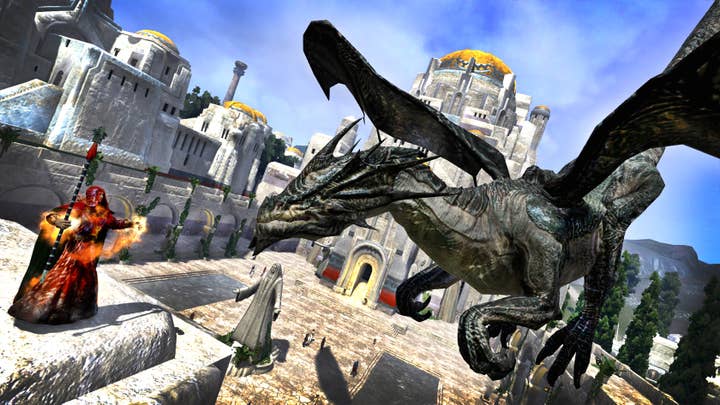Funcom's Rui Casais: From junior programmer to CEO
We speak to the chief exec about his journey to the top, and why he has stayed with the Conan Exiles studio for more than a decade
In 2004, a young Rui Manuel Monteiro Casais joined Norwegian MMO developer Funcom as junior programmer. Ten years later, he was running the company (and still does).
Few complete such a journey - not only because there are only so many CEO positions in the industry, but also because many developers gain experience by moving to different companies throughout their career.
Casais' lifelong service to Funcom began when he was a student in Portugal, finishing his Masters in Computer Science and Engineering. As he prepared to send his CVs to various gaming firms, a friend who played Anarchy Online noticed on Funcom's forums that the company was hiring.
One position - junior AI programmer - tied in perfectly with Casais' thesis on artificial intelligence for online games. He applied, was interviewed by Funcom managers who flew to Portugal, and three days after handing in his thesis, Casais was in Oslo, ready to start.
"My original plan was to go back to Portugal and open my own studio. That was my plan when I was a student. It turns out those two years at Funcom became many - well, they're still going"
"I started with a one-year contract, but I thought, 'Maybe I'll be here two years and then I'll move on'," he tells GamesIndustry.biz. "But I wanted to finish the game - I joined as they were making Age of Conan, which was supposed to launch in 2006 but ended up releasing in 2008. After two years, I was promoted to lead programmer, and right before launch I was promoted to chief technical officer."
As CTO, building and growing the technology team ensured Casais was "never bored" and when management sought someone to open a studio in Canada a year later, he embraced this new challenge. After a couple of years, his wife (a fellow Funcom employee) suggested moving back to Europe and the couple returned to Oslo.
"I think that's when I realised, 'yeah, I really like it [at Funcom]'," says Casais. "Because by that point I knew about a lot of other companies, I'd spoken to a lot of other people, and I liked what we were doing, I liked the people around me."
He continues: "My original plan was to work around different companies and countries for 10 years, and then go back to Portugal and open my own studio. That was my plan when I was a student. It turns out those two years in Funcom became many years - well, they're still going."

The next few years were rough for Funcom, to say the least. The disappointing performance of titles like The Secret World and Lego Minifigures Online caused financial problems for the developer, prompting office closures and several changes of management. Eventually, in May 2015, Casais took the helm - and within a year, the company was back in the black.
"When I became CEO, I didn't know if there would still be a company a year later because we were in such dire straits," he recalls. "But now things are looking up, it's very different to how it was before, and if anything we're expanding into other areas to solidify our base even more."
"When I became CEO, I didn't know if there would still be a company a year later because we were in such dire straits"
The leap to chief exec was the biggest transition Casais has had to make in his career thus far. While his determination to solve problems and desire to have a "full system overview of how all the parts work together" made him a natural choice for the programmer and CTO jobs, running an entire company was a little out of his comfort zone.
"I was always very upfront that I didn't know whether I would succeed, but I knew I would try my best and learn on the spot, which is something I'd been doing a lot," says Casais, adding that he feels he is "still learning" three years into his position.
He continues: "Because we're a publicly listed company, there are a lot of corporate financial compliance aspects, things I used to know nothing about - quarterly reports, annual reports, a lot of dealing with lawyers on contracts and agreements. As CTO, I also dealt with that but I more focused on the positive part of the discussion, whereas as CEO I need to worry about what if it all goes wrong, and if it does I need to be sure we're not going to get screwed by a bad contract. I need to deal with all that bureaucracy - that was a learning experience."
He has also learned that a CEO needs to be a "much better mediator". As CTO, he primarily pushed for that department's needs, but as chief exec he's trusted to "balance all aspects of the game."
"The marketing, the art, the design, the music, the production, getting it done on time and to budget - I need to get them all to work together," he says. "I think my negotiation skills have improved a lot because I need to get people to agree.
"For an engineer, things are much more black and white. For a CEO, they're much more shades of grey."
"Also, talking to press - that's not something you do much as CTO. And I speak to all kinds of press: financial newspapers, gaming press. I've had to learn how to not necessarily say things outright, think more about the words I say because they can be turned against me - that has been done to me, and that's not a very pleasant experience. It's not natural for an engineer where things are much more black and white. For a CEO, they're much more shades of grey."
Funcom celebrates its 25th anniversary this year, with Casais now in his 14th year of employment. Having worked at the company for more than half its life, he has a firm grasp on what defines the firm but is also keen to take it into new and unexpected areas, using upcoming tactical game Mutant Year Zero as an example. But it's not just his decade of devotion to Funcom that he believes makes him a good fit for CEO.
"I'm a pure gamer, so my style of management is different to previous CEOs that were more on the business or financial side," he says. "I'm quite involved - some of the producers would probably say too involved - with the games sometimes."
He continues: "I know what we do, I love what we do, I live and breathe video games. If we were a mega conglomerate of video games studios and publishing and everything else, I would not be the right guy. Because at that stage, you need someone more into financial and corporate structure side of things and that wouldn't be as much fun for me."

Over the years recruiters have, of course, contacted Casais with other positions, tempting him away from Funcom, but he remains adamant he likes the culture where he is - both within the company, and in Norway.
"I do miss being able to sit down and code. There's a certain peace to that"
When asked if he considers it unusual for a games developer to stay with a single company for the entirety of their career, he suggests that it's probably not as uncommon as it might seem.
"I think there are a lot of people that don't hop around and you don't hear about them, because those are the people who are happy with what they're doing," he says. "In my case, if I ever move on to something else, it's because I'm bored and I'm not learning. That's not been the case [at Funcom]."
He continues: "I also really like the people, it's a very flat structure and always has been, so there aren't any politics, backstabbing or anything like that. It's very down to earth, and I like that.
"And it's the interesting challenges. The games are complicated, they're complex to make, so there are interesting engineering problems across lots of moving pieces. And we're not just trying to make something that someone imposes on us, we're doing something that we believe in. So overall, it's a good combination of factors - there isn't one single thing that keeps me here."
Even so, the shift to management can very much be a one-way street for most people, taking them away from the creative and technical challenges that first interested them in working in games and replacing them with those quarterly and annual financial reports Casais now deals with. Does the CEO pine for those earlier times?
"I do miss being able to sit down and code," he admits. "There's a certain peace to that. As CTO, I didn't manage to do that as much as I wanted because I had a lot of things to manage and run, but as CEO there is no time for it at all.
"The higher up you are, the more responsibility your position gets, the less focused work you are able to do. I have very little focus time, and normally it's for important presentation or reports - I often need to work from home so that people can't interrupt me and I can really do it.
"When you're a developer, you have a list of tasks, you sit at your computer and if you want you can just sit at your desk for four hours straight doing that, and you're super focused. As CEO, it's the opposite: I can't sit at my desk for more than five minutes because someone is talking to me in some form - in Slack, on Skype, over the phone, or knocking on my door and barging in. It's satisfying in a very different way, but I do miss being able to sit down and focus on one thing at a time."
Casais' career hasn't turned out as he planned back when he was doing his Masters, but he's certainly not complaining. With Funcom still enjoying the success of Conan Exiles, and new projects on the horizon, the CEO doesn't expect to depart any time soon.
"I still believe I have quite a bit I want to achieve with Funcom, so I don't have a long-term plan," he concludes. "At some point, I would probably like to have my own company, because I'm still an employee - Funcom has been around for a long time."








